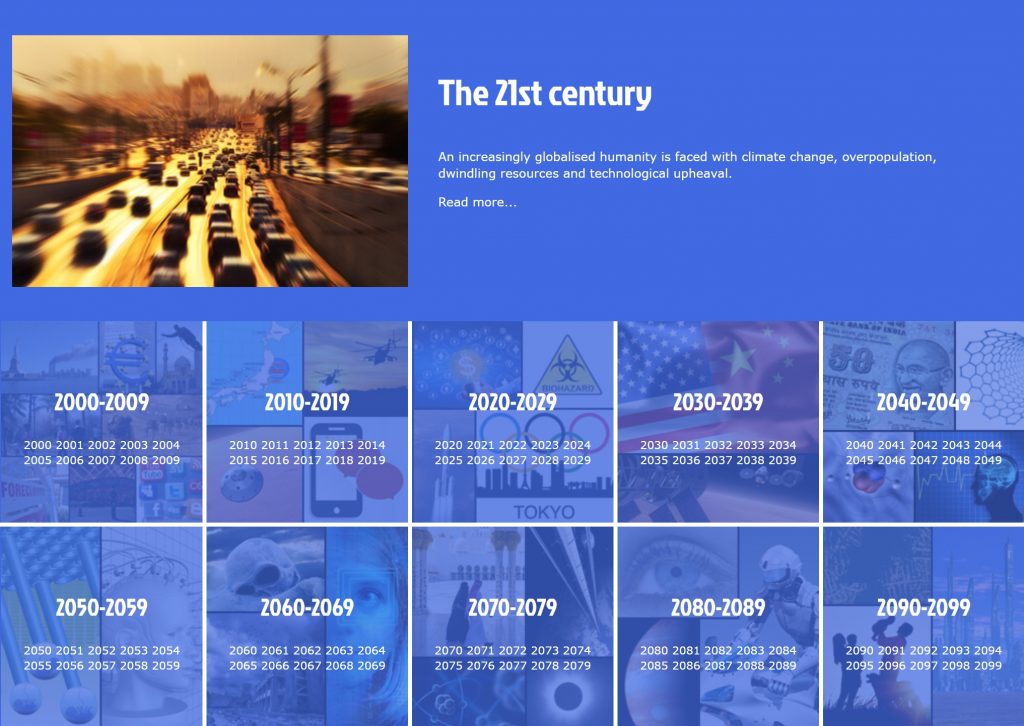Eight years ago I put together a list of the Top 10 Futurist Websites, a post that continues to be the most popular on the site. Now that it’s 2020 and the future is officially here, the time has come to update the list and see if anything has changed.
Interestingly, all of the sites I’d originally chosen are still going strong eight years later; but I’ve reconsidered some and added further thoughts for those returning. In many ways, the longevity of these sites only adds to their importance and relevance.
So without further ado, here is the 2020 Edition of the Top 10 Futurist Websites from Future Conscience:
10) Antiwar.com
War has been a consistent backdrop of the 21st century, primarily as a result of the so-called ‘War on Terror’ but extending out through various regional conflicts and territorial disputes that have been ongoing for generations. The death toll is in the millions, a devastating reality to consider and one that needs to be understood with compassion and a desire to end such violence wherever possible.
Antiwar.com has been a long-standing voice on the internet that has stood against the mainstream media narrative that justifies regime-change wars around the world. Emerging from the Libertarian movement in the United States, the site has grown to become a coalition of all those who oppose wars started by the powerful and fought by the powerless. It’s an excellent aggregator covering multiple conflict zones and has a track record of providing a wide range of viewpoints and links to factual information that often contradicts official propaganda.
9) TheNextWeb
Centered around a large technology conference each year and catering for what they call ‘Generation T’, The Next Web has a strong focus on the commercial and business applications of technology (including blockchain and cryptocurrency). The conferences provided a substantial backbone to the website, that gives any futurist a whole host of thought-leaders and speakers to follow and explore in more detail.
Another useful way to start connecting the dots on your own, they are trend focused and commercially plugged in. This is a site important for any futurist, but particularly those who consider themselves strategic analysts or build a professional career in the field.
8) Gizmodo
Putting the pop culture back into futurist thinking, Gizmodo curates a range of sites that focus on everything from technology news and medical advancements through to movie reviews. They also do a good job of putting together practical guides to bring us all up to speed with the latest software and methods to improve and protect ourselves in this post-digital age.
Similar to The Next Web, Gizmodo focuses primarily on the commercial side of the future – which, as long as it doesn’t subsume the ethics and careful innovation, is a good way to bring yourself up to speed with current trends and political movements, while also getting advice on consumer purchases.
7) Oxford Internet Institute / Institute for Ethics and Emerging Technologies (IEET)
Founded in 2001, the Oxford Internet Institute has been at the forefront of social understanding about the impact of the digital technologies that we use. Their work on Digital Politics and Government and the recently formed Digital Ethics Lab are leading lights in what can sometimes feel like an area lost to vested interests and government programmes. The research done on Digital Citizenship and Surveillance Society, in response to the information released by Edward Snowden, was an important contribution at a time when most others wanted to ignore the reality we found ourselves in. They even produced an overview of counter-surveillance measures, listing the strengths and vulnerabilities of different techniques.
In parallel with the Oxford Internet Institute and equal place for this list is the Institute for Ethics and Emerging Technologies (IEET). The IEET is another old guard of the futurist scene, founded in 2004 by Nick Bostrom and James Hughes. Importantly, they take an academic approach that is somewhat removed from the more commercialised avenues of other organisations. The IEET is to be commended for the critical approach they bring that often acts as a counterweight to many of the state-funded actors and discerning eye on how technological advancements might have a negative impact.
6) Future Timeline

Future Timeline is an independent website that has been leading futurist thinking online for over a decade, starting in 2008 and continuing with regular updates ever since. In particular, this site is well known for its categorisation of different forms of futurist technology and research; while attempting to place everything into a dynamic timeline that helps envisage what the future will look like and when the important landmarks might take place.
This website is part of the ‘old guard’ and an important contribution that continues to exist outside of the commercialised realm that the internet has become. There’s an astonishing amount of content here to go through, all properly referenced and ready to keep any futurist busy and inspired.
5) Science Daily
There are a number of science aggregator sites, but I’ve always found the simplicity and detail of Science Daily to be the most useful and interesting. With over 500 different topic categories, it’s good to get a wide range of news with straight forward views. The key here is that the information presented is scientific and usually referencing a new report or research paper that has been released.
There’s not as much commentary or other forms of ideological discourse listed here, which is an advantage when you just want to get an overview of what’s happening without someone else’s spin.
4) Singularity University / Hub
For a long time, futurist thinking and the Singularity were essentially synonyms thanks mostly to the work of Ray Kurzweill and his 2005 book The Singularity is Near. Whether you think this hypothetical moment will bring about a doomsday apocalypse or immanentize the eschaton depends on how positive an outlook you have about technology, but for many it remains the point on the near-horizon after which nothing else is predictable.
As we quickly approach the timeframes predicted for this exponential charge into an unknown future (various proponents have posited between 2030 – 2100), those most dedicated to singularity theory start to take on an almost religious sensibility. This isn’t necessarily a negative thing, but it’s interesting to watch and tends to lead to more visionary conjectures (prophecies?) as to what the future might entail for us all.
Having said this, the work of Singularity University (founded by Ray Kurzweill and Peter Diamandis) and its Singularity Hub should not be placed in this neo-religious category. The programme run by the university has more to do with executive training and commercial foresight thinking, and the Hub outlines advancements in many different areas. Both do a great job of joining the dots between what can sometimes be disparate sectors. This alone is an important contribution to the futurist field, brought to us by some of its early thought leaders and a well-curated group of technical experts. I’m still waiting for my immortality pills, though…
3) Rand / McKinsey / DARPA
I’ve put together three of the most influential consultant and policy organisations here, because the reports they put out give a detailed insight into the areas of research of most concern to those in power. AI, robotics, cyberwarfare, the future of work, medical technology, the cutting edge of space travel and exploration; these institutions are ones to keep a close eye on, not least of which because they are clear indicators of where large amounts of money are being pushed to advance research.
The RAND Corporation and the Defense Advanced Research Projects Agency (DARPA) are both arms of the United States government, for better or worse, and so you do need to understand that much of their work will have a sheen of propaganda. Knowing what the United States government is most concerned about, however, goes a long way in understanding the direction that global society will be heading towards in the near future.
McKinsey is one of the world’s largest consulting firms and accordingly through the McKinsey Global Institute does a lot of public research of interest to the business community, firmly placed in a capitalist world view and primarily a neoliberal one. This does not undermine the importance of the work they do, however, nor does it mean they don’t take a critical view and suggest some clear improvements that could be made to our current socioeconomic systems. For example, see the excellent analysis they have done on the Future of Work.
Whilst they all need to be taken for the vested interests that they are, these three organisations (and others like them in the think tank space) are showcasing a wide-range of work being done in many areas that will have significant impacts on the future of human society and how it is constructed and maintained. For those who watch power structures for over-stretch and warnings of future oppression, it’s important to keep a close eye on these types of organisations to get early signs of the challenges that are to come.
2) Wired

Wired continues to be a site (and magazine) that brings interesting topics and commentary to the world of technology and its impact on society. More detailed than some of the news aggregator sites, the reason we look to publications such as Wired is because they bring together leading experts who help us better understand the implications and sift through the vast amount of news (and personal opinions) that aggregators such as /r/Futurology or Science Daily provide.
Threat Level remains an important blog on Wired for those interested in cyberwarfare and digital security news (i.e. all good futurists), providing some excellent long-story journalism that is highly entertaining and informative at the same time. Other contributors to the site, such as Alex Davies on transportation, bring a well-curated eye to our collective future and keep Wired at the forefront of the futurist field
1) /r/Futurology
Although there are issues with Reddit being used increasingly for astroturf campaigns, most political subreddits being compromised, and concerns about ownership by the Chinese company Tencent leading to censorship; it’s still absolutely the case that the crowdsourced news platform is a dynamic and fast-moving resource for new information
The /r/futurology subreddit is an excellent source of news and discussion on all things futurist, now with over 14 million members subscribed and at least tens of thousands of people actively contributing content. Since the last list was produced, the group has developed podcasts and a vibrant Discord channel and continues to go from strength to strength.
There isn’t a better futurist news aggregator out there, with substantial commentary and crowd-sourced expertise as a bonus, so make sure you are dropping by regularly to keep informed.
Conclusion
There are countless sites online that cater for those interested in technology and research trends and even more self-professed futurists on social media sites touting their wares. It’s difficult to pick just a few, but the sites listed above are those that will assist any futurist in piecing together a bigger picture about the direction that modern society is travelling and the focus points of our collective efforts.
The purpose of Future Conscience is to ensure that we always play an active role in the creation of our shared futures. It’s not enough to sit back and wait for the future to be built around you, each of us needs to ensure that we are keeping an eye on human progress and helping direct its course to the most positive outcome possible.
Maintaining an interest in the world around you and keeping on top of news and cutting-edge research, particularly those areas being pushed by governments, corporations and other power structures, is the first step in playing an active role in answering the question: What do we want to be?






